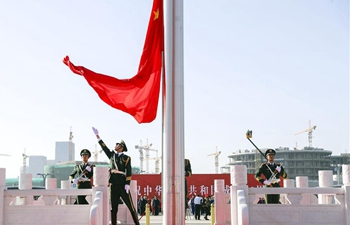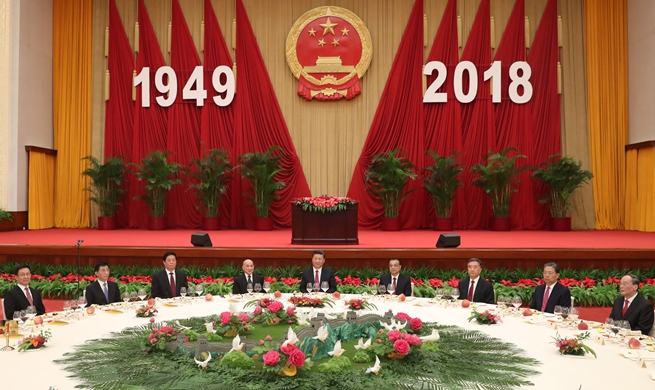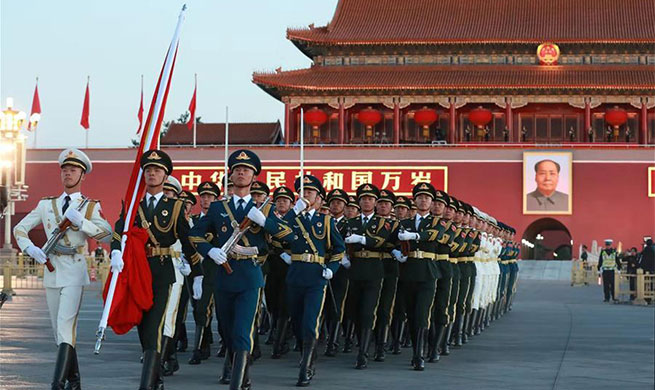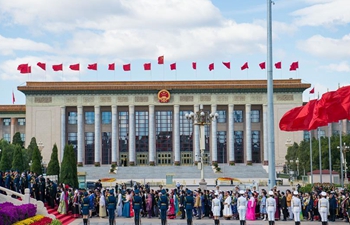RAMALLAH, Oct. 1 (Xinhua) -- Palestinian observers expect further complication in the efforts to resolve the Palestinian-Israeli conflict in light of the U.S. stances that they view as biased toward Israel.
Simultaneously, observers ruled out that the Palestinian leadership would make dramatic decisions to face the U.S. administration and the impasse in the peace talks with Israel which halted in 2014.
During his speech at the UN General Assembly on Thursday, Palestinian President Mahmoud Abbas said he will not accept sole American mediation in the peace process "because the U.S. administration has lost its eligibility due to its recent decisions," referring to U.S. decisions to move its embassy from Tel Aviv to Jerusalem and slash funds to the United Nations Relief and Works Agency for Palestine Refugees in the Near East (UNRWA).
"We have concluded agreements with Israel and they have abrogated all of them. Either Israel abides by these agreements, or we will renege on them. Israel will bear the responsibility and consequences of this," Abbas warned.
Abbas' speech came hours after U.S. President Donald Trump announced on the sidelines of his meeting with Israeli Prime Minister Benjamin Netanyahu in New York that his administration would be able to present a peace plan within "two to four months," expecting the Palestinians to return to the negotiation table by 100 percent.
Trump declared for the first time his support for the resolution of the Israeli-Palestinian conflict on the basis of a two-state solution, believing it was the best option, but without announcing any practical measures to push for the implementation of this internationally-backed solution.
On the other hand, Netanyahu said he was not surprised by Trump's support for a two-state solution, stressing his insistence on keeping Israeli security control over the West Bank in any future peace deal with Palestine, which the Palestinians strongly rejected.
Ghazan al-Khatib, a political science professor at Birzeit University in Ramallah, said all the indicators point to more complications to resolve the Palestinian-Israeli conflict, especially in view of the American and Israeli positions.
Al-Khatib said it is highly unlikely that there will be any serious progress in the peace process, considering the Palestinian rejection to the positions of the Trump administration, which is working to impose a de-facto by applying its ideas rather than discussing them with the parties involved.
"Trump's policies and actions on the ground are a recipe for complicating the Israeli-Palestinian conflict rather than resolving it, which puts the entire region in the face of difficult choices and instability," Khatib told Xinhua.
At the same time, Khatib said it is unlikely that the Palestinians would take remarkable decisions to face the approach of Washington and Israel, expecting that the Palestinian maneuvers will be limited.
"The Palestinians will practice some political and legal pressure at the international level ... They would also escalate the protests against the Israeli occupation," he pointed out.
Khatib explained that implementing Abbas' threats means the collapse of the Palestinian Authority, "an option that is unacceptable by the Palestinians as well as the international community."
The Palestinians have been boycotting the United States since Dec. 6, 2017, when Trump declared Jerusalem as the capital of Israel, especially after May 14, the day the U.S. embassy in Israel was moved to the disputed holy city.
The Palestinians seek to establish an independent state with East Jerusalem as their capital, while Israel insists that the entire Jerusalem is its eternal capital.
"Trump is actually implementing his plans which serve Israel's interest and exclude the Palestinian right ... He is imposing conditions, not solving a conflict," Hani al-Masri, a Ramallah-based political observer, told Xinhua.
He added that Trump is carrying out his plan to implement the so-called "Deal of the Century" on the ground.
"Among the steps are his recognition of Jerusalem as the capital of Israel, cutting aid for UNRWA, legalizing the Israeli settlement as well as adopting the Zionist narrative of the conflict," al-Masri noted.
The expert added that the Palestinians will not bet on Washington, stressing that they will form a new vision and strategy, including not only rejecting Trump' plan, but also working to frustrate it.
Trump's senior advisor Jared Kushner told Palestinian Al-Quds newspaper in June that the United States will announce its peace plan soon.
While Kushner refused to reveal details of the plan, Israeli reports said the U.S. initiative suggests that Abu Dis village in East Jerusalem will be the capital of the future "unarmed" Palestinian state.
The reports also said the U.S. government will ask Israel to withdraw from three quarters of Arab neighborhoods in East Jerusalem, adding that Israel will maintain control of major settlements in West Jerusalem as well as the Jordan Valley.

















